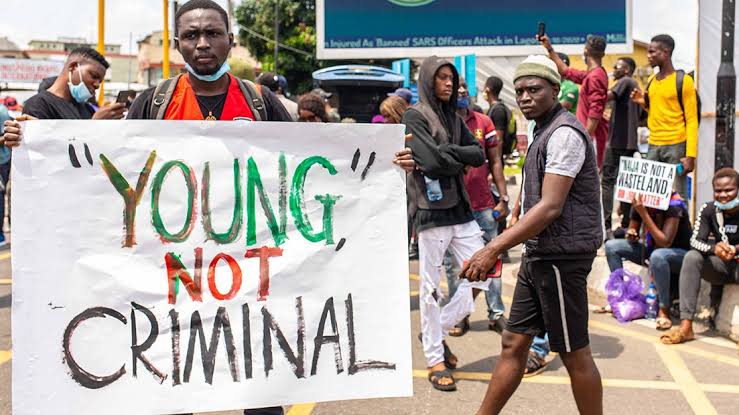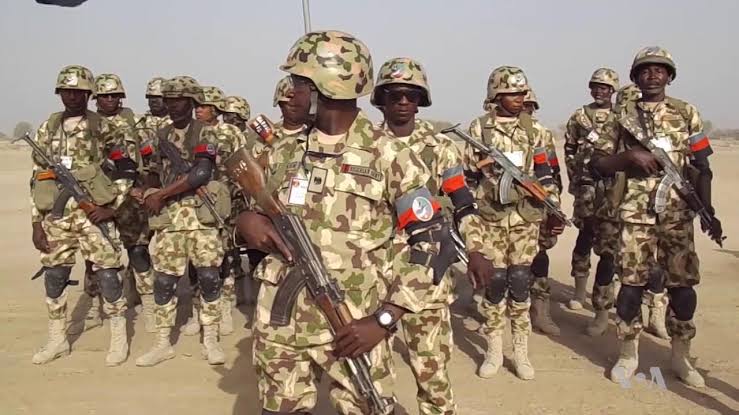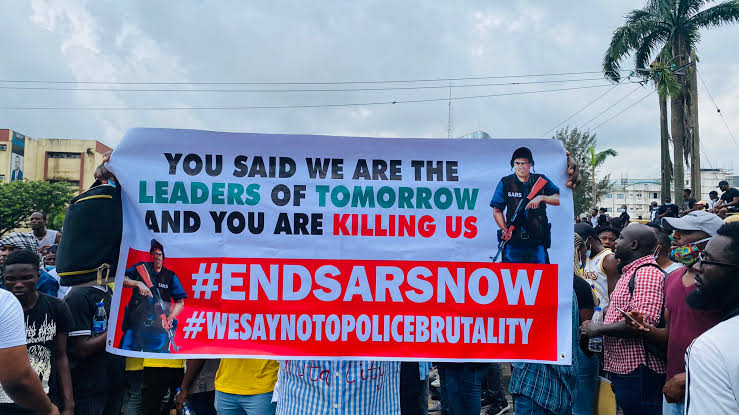
Prior to the 2020 ENDSARS protest, at least 7 out of 10 Nigerian Youth aged between 17 and 35, would have faced one form of brutality, a wanton violation of human rights and or a total disdain for the rule of law from state actors, and the protest was the last straw that broke the camel’s back. Intended to be the first in the series of good governance demands from the Youth, it was not only slain, but several Nigerian Youth were also murdered in their prime.
The few that survived, fled the country for safety, hence the now popular migration parlance, Japa. Japa is a combination of two Yoruba expressions, já | pa, meaning “to flee”. However, it’s more than an expression for migration as it reflects the desperations, hopelessness, and fears of the Youth. Better put, japa means to “flee to safety”.

From pre-colonial era, protests have continued to be a significant aspect of our civil life with different movements and groups addressing inflations, bad governance, unemployment, and insecurity in Nigeria. In 1929, a protest was staged by women in Southeastern Nigeria Abia State labelled Aba women riot against several colonial administration policies.
Many years after in 2017, the Nigerian Army clashed with Youth in Abia State after setting up an operation code-named Operation Python Dance ll (Egwu Eke ll) in five states of the Southeastern region. Typical of state actors, actions don’t often march intentions. The military said the operation was to address kidnapping, armed robbery, among other crises in the region. Unfortunately, it only delivered anguish and gnashing of teeth to the people of Abia state.
This goes to prove to the international community that the ENDSARS protest of 2020 was not the first time state actors are violating human rights and frustrating the Youth. A writer, Ademolawa Michael Adedipe, in his Play published by Research Gate in 2021 had put it better. Adedipe said; “Python Dance was a brutal Military mission against those they were supposed to protect”.

The situation in Nigeria is very scary as participating in any protest against the government is almost tantamount to a criminal offence for which some protesters have spent years in prison, tortured, maimed, killed or forced into exile, especially Youth leaders, protest sponsors or human rights activists.
After the blood birth experienced during the ENDSARS protest to address police brutality proved to be a decisive factor, many young Nigerians are giving up on the vision of a “Better Nigeria”. Their desire to leave the country crystallized into action. Leaders had disregarded their criticisms, and, for some youth, it seemed futile to continue struggling for a Nation that seeks to destroy them.
Consequently, we have seen a significant increase in the number of young Nigerians departing the shores of the country for safer and saner climes. According to a study published by UNESCO in 2021, several young Nigerians, aged between 15 and 35, are desperate to migrate despite the myriad of migration challenges that they may encounter. Especially after seeing that neither the United Nations, Amnesty International, Human Rights Watch, nor Transparency International seems capable to demand justice from Nigerian Government on human rights violations.
Godfrey Ibe, who was on his compulsory National Youth Service Corps (NYSC) in Abia state at the time recounted how he was yet to recover from the happenstance. “I had only just arrived for my youth service year and was enjoying the peaceful atmosphere in Aba when it happened. I could not stay to complete my NYSC after the incident because my parents ensured that I was redeployed to Lagos State. When the military invaded the state Capital of Umuahia, it was like a Hollywood movie for me. They were shooting at young people and carrying the bodies. Having witnessed the Python Dance in Abia, I was afraid to join ENDSARS. This experience made me think it is a crime to be a Youth in Nigeria.”
Expressing his fears, Victor Nwaeze, the Youth leader from Afara Ibeku to Ohuhu in Abia State said; “I don’t feel safe in Nigeria any longer, and I definitely don’t want my children to experience this terror”. Reliving his experience as a Youth Leader in Umuahia during Operation Python Dance, Nwaeze described the military operation as a terrible experience for the entire people of Abia State and a blatant violation of human rights. Nwaeze who is being hunted alongside others by security forces for defending the Youth of his community said: “They started labelling us as fighters of the proscribed Indigenous People of Biafra (IPOB) to justify the unwarranted assault and I had to relocate to another state because the military started picking up youth leaders and youths randomly. Today many of them cannot be accounted for. I clearly remember how surprised I was when a friend, Godday, called me to say that the military had unleashed terror on the youths of Afara. A few months after, my mum died from the shock of my sudden disappearance thinking I had been killed or taken by the military,” teary-eyed Nwaeze recounted.
Anthony Ukanwa, a businessman in Cameroon narrated how the operation stole the stability and peace previously enjoyed in Abia and neighbouring Eastern states. Recounting the incident that made him relocate to the Central Africa country, Ukanwa said: “The last 5 years has indeed been one filled with feelings of trauma and fear. I am happy to hear that the current governor is handling the situation well and restoring peace, but truth be told, I can’t return home again. You know many youths that survived the carnage like me had to leave home for fear of the military and their Python dance. We consider it a politically motivated move in disguise to destabilize the eastern region. Umuahia was like a ghost town for a long time.”
In conclusion, protests in Nigeria won’t stop because it is a medium for the masses to draw attention from the government. Sadly, responding with the military signals a military regime in democratic camouflage. Not in 1929 and not in 2020. Thus, state actors need to do better in addressing Youth restiveness or civil movements and groups who come together to place civil demands on the government. This underscores the essence of democracy and the rights of the people to free expressions. This is particularly important because many young Nigerians no longer think it is safe to remain in Nigeria, which further exacerbates the brain drain challenge that the country is grappling with.
Rather than using forces, addressing the root causes of youth discontent through dialogue, economic opportunities, and inclusive governance is crucial for sustainable peace and development. It is essential for state actors to respect human rights and engage in peaceful conflict resolution strategies to prevent further aggravation of youth restiveness. From one disappointing administration from a minority South-southern State to another in the North, let’s keep fingers crossed and see how many more years before another decisive protest breaks or movement against bad governance, since no government has succeeded in making Nigerians proud since democracy.
